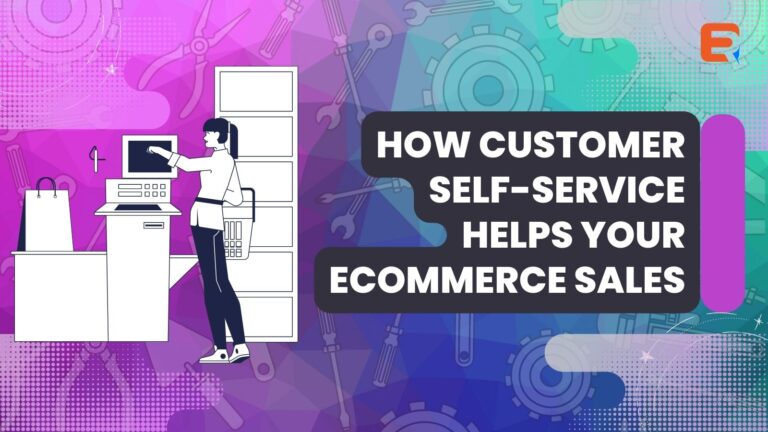Customer service plays a massive role in customer loyalty, with over 90% of U.S customers using customer service as a deciding factor on whether to continue patronizing a business. The same applies to eCommerce as well.
Customers expect proper care from your online store, like making inquiries about your shipping costs, purchase returns, and product inquiries without waiting for a response.
Also, since you’re most likely dealing with patronage from different time zones, having an effective customer self-service system is crucial to your business’s success. For a better perspective, this article presents the various ways customer self-service empowers your brand.
What is Customer Self-service?

Before dissecting the role customer self-service plays in your business success, it’s worth properly defining it. In simple terms, customer self-service is a system businesses employ to help customers solve their problems without needing a support agent.
This system can come in tactically-placed policies, FAQ sections, chatbots, and many more. Using this method increases customer satisfaction as it takes little to no effort to resolve issues before purchasing.
Additionally, incorporating a self-service customer system is possible for any online store regardless of the size of internal tech resources. It’s very affordable.
Benefits of Customer Self-Service
As previously mentioned, 90% of customers expect to solve their problems on your site without needing to send a direct email to your business for support. Furthermore, recent research reveals that 96% of dissatisfied customers will cease patronage without complaining, and 91% of them may never return.
Fortunately, having a self-service customer system reduces the chances of dissatisfaction and offers many benefits. This includes:
1. Reduced Cost
One unique appeal of eCommerce is the small number of staff needed to run the entire store. However, without a functional customer self-service system, you’ll need a team to handle the influx of inquiries from curious customers.
The cost of hiring this staff, covering their tools, and paying their salary bleeds your business of some much-needed resources.
Additionally, a study by Live Agent revealed that 66% of customers try self-service before contacting a live agent for support. So essentially, you will experience a reduction in the support tickets coming through your inbox and not pay support agents.
2. Increased Efficiency
Businesses prioritize efficiency directly affects your business’s revenue and customer perception, which is one reason why graphQL is preferred by Shopify. In addition, GraphQL saves time when making multiple resource requests, handling data, and more.
Having self-service can optimize your business as well. For example, scheduling or taking payments can be faster with a self-service system than having a team or administrator schedule the appointment or take the charge manually.
With self-service automation software features like automatic payment link generation, your business can service more customers without needing you to make minor adjustments regularly.
3. More Traffic to Your Website

Providing instant answers to customers in places they can find improves the customer experience and brings more people to your website. For instance, an FAQ section that answers questions concisely will appear on Google as a featured snippet.
Statistics show that 35.1% of Google search clicks come from featured snippets, meaning extra traffic to your online store, leading to increased patronage.
Furthermore, by showing up on Google answering curious customers’ questions, you can restart the buying process, get them to buy from you, and even have repeat purchases for a memorable customer experience.
4. Provide Value Around the Clock
According to reports from HubSpot, 90% of customers expect to receive an instant response to their complaints; unfortunately, you may not be available 24/7, primarily if you serve multiple time zones.
In this situation, an effective self-service system ensures that customers find answers to their problems and proceed with their purchases. You can accomplish this goal with an FAQ section, automated chatbot, informative articles, and other tools.
5. Provides a Competitive Edge
Standing out from the crowd and having a competitive edge is essential but challenging for most businesses. However, implementing a self-service system can provide an advantage in your industry.
Essentially, customers will continually patronize your store if you provide answers to their problems compared to other brands without these factors. Making that dreaded phone call or sending an email with no definite response time is a deterrent.
Ultimately, business elements like a self-service customer system contributed to brand loyalty and domination of an industry.
Types of Customer Self-service

You can employ different self-service options based on your business, capacity, and budget. While some of these options are more popular, they are effective at answering questions nonetheless.
Here are some examples of customer self-service:
1. FAQ Page
The Frequently Asked Questions section is an option almost every customer expects to find at the bottom of your page. It contains a list of common questions your brand received in the past and answered them articulately.
The answers here are short and straight to the point, providing no in-depth explanation but enough information to satisfy the question.
2. Chatbots
Unlike live chat, where customers communicate with an agent, chatbots are purely operated by artificial intelligence. Essentially, the system uses machine learning to provide answers to common questions conveyed in natural language. This type of self-service mimics human interaction and seems very real.
3. Knowledge Base
You can opt for a knowledge base, a digital library containing content that most likely answers customers’ questions. These include articles, videos, pictures, short posts, and more. It’s a more in-depth version of an FAQ page.
4. Forums and communities
Forums and communities can efficiently serve as a self-service tool where customers can collaborate with agents, admins, and each other to answer questions from newcomers. Also, old interactions are available for revisits if the problem arises again.
Conclusion
Implementing a self-service system presents your business with a multitude of valuable benefits. These advantages raise your revenue, customer experience, public perception, and Google ranking. It’s a must-have for eCommerce entrepreneurs that prioritize growth.




